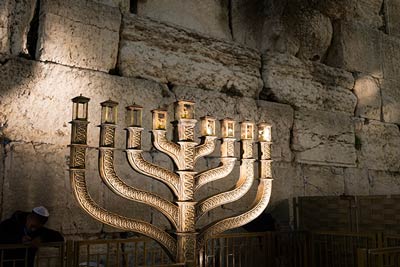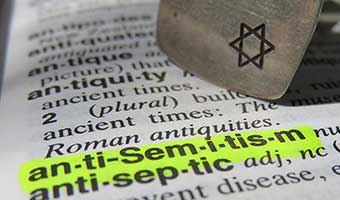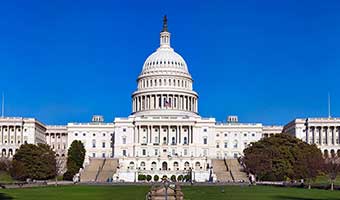
Eighth Night
The last day of Hanukkah has a special name: Zot Hanukkah. Zot means "there it is" as if you are pointing. The last day has a beautiful mystical concept. As Hanukkah is ending we need to take the light into ourselves.
With that in mind, let's end this series of Hanukkah Netletters with another story I heard this week from Prof. Itay Chowers, the new head of the Ophthalmology Department. A teenaged boy came to him from Gaza. His eyes were in terrible shape. He had retinoblastoma, a rare cancer of the retina. He'd undergone unsuccessful surgery. He'd had trauma to his eyes from a blow or accident. One eye was now blind. The other had minimal vision. We don't know how he found his way to Hadassah.
"There are no answers for such a case in the books," said Prof. Chowers, "but I decided to do what I could." He cleaned up the remnants of the cancer, attached the retina, applied silicone oil to hold it in place and made a few other medical adjustments. The boy was able to see in one eye. One day the boy knocked on his door. He had graduated from high school and taken his exams, placing number one in his school. The valedictorian prize was a trip to Jerusalem. He couldn't come to Jerusalem without thanking the Hadassah doctor and hospital that had made the greatest moment of his life possible. Think of all the light we can bring to the world just by belonging to and supporting Hadassah!
Wishing all a holiday of light and joy!
From Jerusalem with Love.
Zot Hanukkah!
Candle 7
Ever visit a dog pound? Most of the dogs have undergone abandonment or abuse. But what would happen if teens who had undergone abandonment and abuse took care of them? At Hadassah Neurim, our Youth Aliyah village near Netanya, the once-pitiful dogs are thriving under the care of these teens who come from broken families. It's the newest idea to help the teens at the residential youth village gain self-esteem, to give and receive love and to learn about responsibility. 450 at-risk teens go the school, take part in sports and music, and learn to follow a routine after coming from dysfunctional homes.
Candle 6
"We can't use them, but we must look at them" goes the prayer we say after lighting candles. It always makes me think of the blessing of sight. With that in mind, I had a talk with the new head of the Department of Ophthalmology Prof. Itay Chowers, 52. He told me about a recent Friday night, when at 11 pm he'd finished dinner with his wife, Debbie, and three teenaged and young adult children. He was ready to go to bed when his phone rang. A Border Policeman had succeeded in stopping a terrorist at the Damascus Gate. His buddy noticed that there was a red spot in one of his eyes. They went to check it out at Hadassah Hospital. "It turns out that he had shrapnel from the fire fight in his eye and the resident on duty wasn't sure how deep it was. When I got there, the tests showed a very serious injury. I scrubbed up and we began operating to remove the foreign body. If it's iron, irreparable damage can be caused to the retina from the toxicity. I worked with a magnet to remove it, but it wouldn't stick. I took it out with tweezers. The police laboratory technicians came out in the middle of the night to see what it was. Turns out it was tin, which terrorists use to make their homemade bullets. Tin doesn't have the same toxicity, so he was lucky. Still, when his officer asked if he could come back to work right away, I insisted that he take a few weeks off to heal. That night I finished surgery and got home about 5 am. When the kids got up later, they asked if I'd slept well. The truth is, I felt wonderful. The brave officer had risked his life to protect us, and our Hadassah team had made sure he would continue to see the light." Hanukkah Sameach!
Light 5
What a beautiful Shabbat Hanukkah in Jerusalem. Hanukkah lights in nearly every window or in special boxes on the street. Tables with latkes as side dishes and sufganiot, Hanukkah donuts for dessert.
Here's a new Hadassah miracle story. Leah-Sara Binyimini, 35, was living with her husband and three children in Beit Shemesh, a city near Jerusalem, where they also have a retail clothing shop. In the summer of 2014, she went to work as usual, but got the worst headache of her life, so bad that she collapsed and was rushed to Hadassah Ein Kerem, where a CT scan revealed that she had a cerebral hemorrhage from two aneurysms. Neurosurgeon and Department Head Prof Jose Cohen operated on her, and she made a remarkable recovery. But a few days after returning home, she lost consciousness. A third aneurysm was discovered. Even one aneurysm is life-threatening. Prof. Cohen fixed that one, too.
Said Binyimini, "Prof. Cohen, who insists I call him Jose, made me feel confident. I felt as if God Above was guiding his hands." She confided in him that she'd always hoped to have another baby and supposed she would have to forgo it. "To my shock, Prof. Cohen told me to go ahead and get pregnant. I was in touch with him throughout the pregnancy." And because Binyimini believes in miracles, and because her baby Shira has just turned 1, Binyamini was back in Hadassah right before Hanukkah to show Jose the birthday photo of her daughter.
"He saved my life twice and gave me the life of Shira," said Binyamini. "We owe him and Hadassah so much. How could we celebrate a birthday without coming to say thanks? We plan to return every year at Hanukkah to update him on our miracle baby. She's brought so much light to our lives."This Hanukkah, add light to the lives of some of Israel's most critically ill children.
- Barbara Sofer, Israel Director of Public Relations
Hadassah Offices in Israel, Jerusalem
This Hanukkah, add light to the lives of some of Israel's most critically ill children.
Learn more about the Hadassah Medical Organization.








